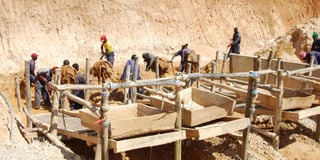Prime
New Bill to establish government mining company

Mining, according to Ms Agnes Alaba, the commissioner for mines, directorate of geological survey and mines, must be streamlined to limit who mines and who does not mine some minerals. PHOTO BY EDGAR R BATTE
Kampala- Government is seeking to create a National Mining Company, through tabling a Mining Bill, according the commissioner for mines, directorate of geological survey and mines .
Speaking during the national conference and exhibition on artisanal and small scale mining and quarrying last week, Ms Agnes Alaba, said government is in the process of drafting a Mining Bill that will create a national mining company.
“We want a national mining company where government can participate in mining activities, access reserves and undertake mining for key strategic minerals,” she said, noting that it was safer for government to limit the mining of some minerals such as uranium.
Uranium is used in the manufacture of different weapons and some dangerous chemicals.
Ms Alaba said the bill will seek to define strategic minerals, specifically those that influence growth and development of Uganda, noting that whereas there is a likelihood of creating competition between government and the private sector, this will be streamlined to define areas where government can and cannot operate.
“The company will not encroach on areas explored by private sector players, but will only operate in areas where government has undertaken exploration or unexplored land,” she said.
The mining bill is currently in the consultative phase with different stakeholders weighing in on the tenets of the proposed law.
However, Mr Don Binyina, the Africa Centre for Energy and Minerals Policy (ACEMP) executive director, said the drive to create the national mining company is misguided, noting that it could be driven by the excitement derived by the oil and gas sub sector.
Government, he said, lacks the financial discipline to sustain such a company, saying: “It takes a lot of resources both human and financial to sustain a mining company because we have different silos in the mining subsector,” he said.
Mr Binyina also said the unpredictable nature of the mining sub sector, characterised by booms and bursts in reserves, makes it complicated for government to sustain a company.
“Government may push and create the mining company but I will be vindicated a few years down the road when sustainability becomes a challenge for them,” he said.
The mining sub sector has seen a drastic drop in contribution to the country’s economy from 30 per cent in 1950’s to less than 1 per cent currently.
Mr Binyina attributed the drop to the high capital investment in the mining business.
Research findings by the Africa Centre for Energy and Minerals Policy, indicate that about two million people are directly and directly employed in the artisanal and small scale mining subsector but only 400 people are directly employed.
Status of the mining sector in Uganda
The mining sector, according to Uganda Investment Authority, peaked in the 1950’s and 60’s waith a contribution of up to 30 per cent export earnings. However, in the 80, drastically declined falling to only 0.3 per cent in 2010. However, in the last two decade there has been remarkable growth with the sector growing by 19.4 per cent in 2007 and 12.8 per cent in 2010 respectively.
The principal minerals that have been mined in the past include, copper-cobalt, gold, iron ore, lead, lithium, niobium-tantalum (columbite-tantalite), tin (cassiterite), titanium, tungsten, silver, zinc. Others are; talc, mica, graphite, kyanite, aggregate, crushed and dimension stone, clays, diatomite, feldspar and glass or silica sand, kaolin, limestone and marble and phosphates, among others.




